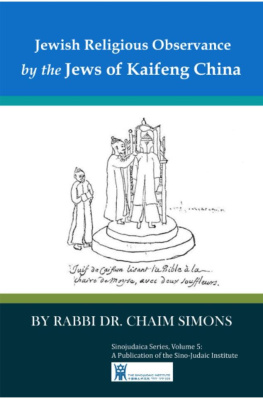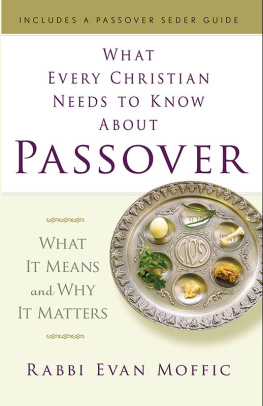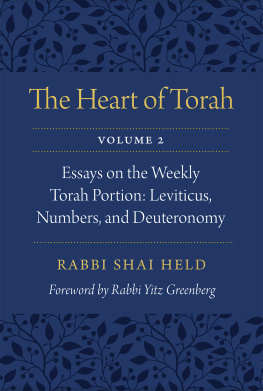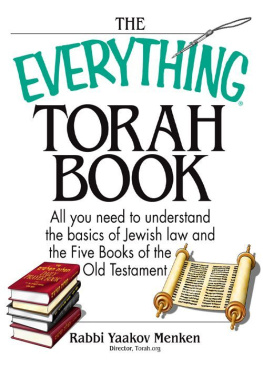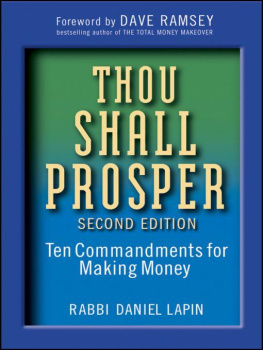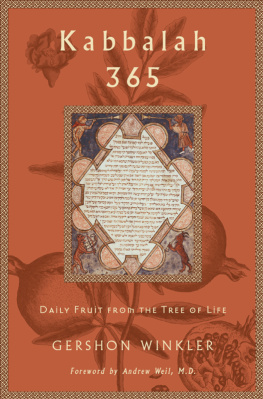
SACRED
SECRETS


SACRED
SECRETS

THE SANCTITY OF SEX IN
JEWISH LAW AND LORE
GERSHON WINKLER

This book was set in 12 pt. Souvenir by Alpha Graphics of Pittsfield, New Hampshire.
Copyright 1998 by Gershon Winkler
10 9 8 7 6 5 4 3 2 1
All rights reserved. Printed in the United States of America. No part of this book may be used or reproduced in any manner whatsoever without written permission from Jason Aronson Inc. except in the case of brief quotations in reviews for inclusion in a magazine, newspaper, or broadcast.
Library of Congress Cataloging-in-Publication Data
Winkler, Gershon, 1949
Sacred secrets : the sanctity of sex in Jewish law and lore / by Gershon Winkler.
p. cm.
Includes bibliographical references and index.
ISBN 0-7657-9974-X (alk. paper) ISBN 978-0-7657-9974-6
1. Sex in rabbinical literature. 2. Sex in the Bible. 3. SexReligious aspectsJudaism. 4. Rabbinical literatureHistory and criticism. I. Title.
BM496.9.S48W56 1998
296.3'66dc21 97-19872
Manufactured in the United States of America. Jason Aronson Inc. offers books and cassettes. For information and catalog write to Jason Aronson Inc., 230 Livingston Street, Northvale, New Jersey 07647.
Contents
1
JUDEO LIBIDO
Unlike the common cold, which has been with us for many thousands of years, sexual taboo is a disease invented by humans and blamed on God. By this era it has germinated into a source of emotional and physical conflict so severe as to warrant the unprecedented emergence of physicians and counselors specializing in human sexual inadequacies. So, taboo or not taboo? That is the question that both Jews and Christians must ask of their current religious sex ethic. For Jews it is a code of ethics that is anything but Jewish, and for Christians it is a moral structure founded upon blatant misinterpretation of Jewish Scriptures.
Most of us are passive beneficiaries of so-called Western civilization, accustomed to a code of sexual ethics we glibly call Judeo-Christian, a code that is essentially far more Christian than it is Judeo. Judaism absorbed much of sexual taboo only after centuries of subjection to host religions and cultures that all but squelched the notion of sensuality, often by pain of death. Under such conditions, laws evolved in the Jewish codes that strove to parallel the sexual ethics of Jews with those of Christians, for example, so that the Jewish community would hold yet one more ace in its survival cards. Women, Jewish and Christian alike, often were chosen as well, as fodder for the fires of hatred sparked by a religion of love. After all, the medieval church barred women from the use of their intellect, intuition, or medicinal knowledge, the exercise of which would taint them instantly with suspicions of sorcery and witchcraft, with consequences of torture and death. No wonder the Jewish communities, persecuted always for theological reasons, kept their people in check during those many centuries of subjection to Church rule. And while Jewish women enjoyed respect as spiritual teachers, their learning and public positions in the Jewish communities of Christian Europe were subdued and discouraged over the centuries in order to protect them from the bonfires of misogyny that burned randomly about them. Were Jewish women to become too public, were the sexual ethics of the Jews to become less stringent than those of the Church, it would only further fuel the inferno that consumed them unceasingly for close to 1,700 years. They couldnt take such chances, so the ancient laws that permitted polygamy, variations in positions during sex, coitus interruptus, nonmarital sex, contraception, etc., were gradually sublimated, gathering the dust of ages while hidden away in tiny print along the margins of ancient and medieval texts preserved for posterity.
Nonetheless, the mystery of how sex became stigmatized and turned into something evil and dirty to begin with remains at large. The eighteenth-century Rabbi Yaakov of Emden tackled the question in regards to his own people and posits that the Jews 1,700-year-old subjection to the strictures of the Church had obviously supplanted their original Judaic sex ethics with those of Christianity (Shaylot Yaavetz, vol. 2, no. 15 toward end). Emdens theory is somewhat echoed by the noted Anglican theologian, Dr. Derrick S. Bailey:
The Christian attitude to sexuality in all its aspects was profoundly affected by the ascendancy of Hellenistic dualism over Hebraic naturalism during the first great age of the Church. The Jewish conceptions of coitus, marriage, and children, positive and affirmative within their inevitable limits, were almost entirely overlaid by the Graeco-Oriental tendency to... look upon sexuality as something not only emotionally disturbing, but also in some sense defiling and tainted with evil. (Sexual Relations in Christian Thought [New York: Harper & Bros., 1959], pp. 100101)
Sure enough, as one examines the earliest Jewish teachings of other aspects of human sexual dynamics, it becomes increasingly clear that somewhere between the Judeo and the Christian some very basic concepts about sex got carelessly, if not deliberately, distorted. One theory has it that Paul, not Jesus, was responsible for setting this trend into motion and that he was motivated to downplay sensuality because he believed that the physical world was coming to an end and that the second coming was at hand. But regardless of who was to blame, the fact remains that this mythical Judeo-Christian sex ethic has left countless dangling helplessly between the puritan values with which they have been raised and the redefined moral structures now being pressed upon them by a new paradigm. The re-examination of the original Judaic sources on sex is therefore extremely urgent, for both Jews and Christians alike (as well as for non-religiously affiliated members of Western society), for both suffer their psychosexual ailments on account of a moralistic system intended for neither.
The primary Judaic view on sex is best summarized by the thirteenth-century Rabbi Moshe ben Nachmon (Ramban) in his classical sex manual, Iggeret HaKodesh, or Epistle of Holiness (p. 175):
No one should claim that sex is ugly or repulsive. God forbid! For sexual intercourse is called knowing in the Scriptures (Gen. 4: 1), and not in vain is it called thus.... If we were to say that sex is repulsive, then we blaspheme God Who created the genitals.... All body parts are neutral; the use we make of them determines whether they are holy or unholy.
During the same century that Rabbi Moshe ben Nachmon wrote these words, Pope Innocent III declared that the sexual act is so shameful as to be inherently wicked. Less extreme Christian expositors of the same era warned their constituents that the holy spirit absented Himself from the room of married folk performing the act even for generation alone (
Next page

